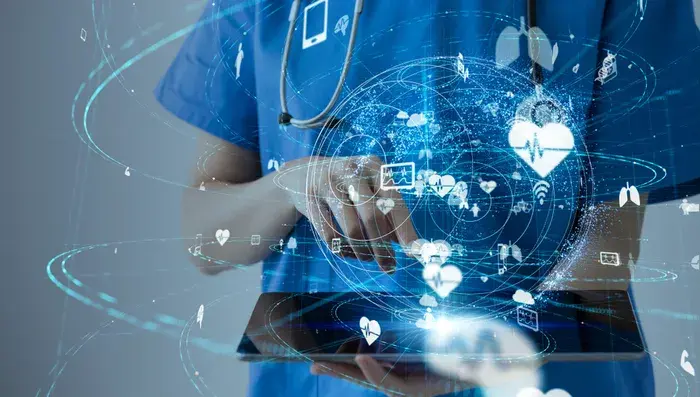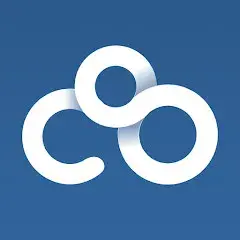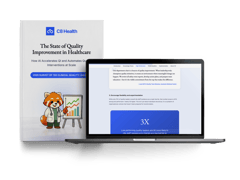
8 Examples of Health Information Technology and Their Uses
Healthcare Information Technology (HIT) involves using computer hardware and software to manage, share, and analyze medical information. It makes providing healthcare services more efficient and cost-effective. That's why the HIT market is rising almost 20% each year. [1]
New tools and tech solutions regularly hit the market and are adopted into hospitals and care facilities. Below, we'll look at some key examples that can improve patient care and see their uses in the clinical setting.
» Reduce administrative burden with the most practical type of health information technology: A knowledge management system
1. Electronic Health Records (EHR)
EHRs are the backbone of modern healthcare. As of 2021, as much as 88% of US office-based clinicians use at least one form of them. [2] This information technology improves operational efficiency by removing the need for clinicians to review patient's medical history manually.
» Discover innovative approaches for driving operational efficiency
This technology has significantly improved the efficiency of healthcare delivery. Since clinicians don't need to review literature or patient records manually, there's a reduced risk of medical errors.
You can integrate them with clinical decision support systems to provide healthcare providers with evidence-based treatment recommendations. They can also improve care coordination for chronic conditions that require the involvement of multiple specialists.
Navigating poorly optimized health records systems can become a time sink for any healthcare organization. Our latest survey found that the average hospital worker spent 65 hours per year navigating knowledge management systems, time that could be otherwise spent helping patients. Download The State of Knowledge Management in Hospitals to learn more.
2. Knowledge Management Systems
What if your clinicians could access all your institution's guidelines in a single platform? Would this improve patient care and operational efficiency? Think about it: a central repository of information visualizing all point-of-care guidance that providers can easily view and share.
C8 Health is a knowledge management system that addresses all of those points. The platform effectively disseminates knowledge among your staff and keeps them updated on any changes you make.
3. Medical Imaging
Medical imaging technologies like X-rays and scans have become prevalent in healthcare. These systems now use AI to interpret pictures, highlighting areas of concern to improve diagnostic accuracy. It can also detect image modalities at various treatment stages, such as tumor delineation. [4]
Thanks to machine learning, clinicians can now complete mammogram reviews almost 30 times faster than before, with an accuracy rate of nearly 99%, meaning biopsies are less required. [5]
» Check out the pivotal role AI plays in modern healthcare
4. Remote Patient Monitoring
Remote monitoring has become an integral type of health information technology, with the global market for wearables expected to reach $46.6 billion by 2025. [6]
Devices like weight scales, pulse oximeters, and blood glucose and pressure monitors collect physiological data in real-time. Clinicians can use this data to follow treatment progress between clinic visits or when in-person care isn't possible.
» Find out how knowledge management systems reduce healthcare costs
5. Master Patient Index (MPI)
The master patient index in healthcare is a central hub that assigns unique identifiers and links patient data across various systems. [7] It connects registration, EHRs, and labs to create a comprehensive medical record. This improves care coordination and patient safety.
Let's say a patient sees a cardiologist for chest pain and later visits an urgent care for a sprained ankle. With this type of information system, both providers can access the person's medical record, including medications and allergies, to avoid potential interactions.
» Check out the latest advancements in medical technology
6. Patient Portals
Patient portals give people easy access to their health data. For example, they can log in and see doctor's notes, immunization records, and upcoming appointments. Depending on the platform, they may also securely message their doctor with non-urgent questions or ask for prescription refills.
» Try innovative patient care by integrating AI into your organization
According to research, this type of health information technology may have a positive effect on health outcomes. [8] It can lead to improved interaction with clinicians and patients, sticking to therapy, and being aware of their condition at a given time.
But, it's still unclear whether the use of these information systems improves healthcare facility efficiency as a whole. Finally, there's also a trend of higher adoption rates among older individuals and women.
» Find out how CRM automation can help your healthcare facility
7. Laboratory Information System
Laboratory information systems streamline workflows and improve lab efficiency. For example, a doctor would use them to order blood tests for a patient with suspected anemia.
The software receives the order electronically, tracks the blood sample through testing, and automatically generates a report with the results. The doctor can then access the results quickly and efficiently, helping them diagnose and form a treatment plan faster.
According to a systematic review of the literature, these platforms can reduce medical errors throughout testing while improving decision-making and patient care. [9] They can even include genetic data for more informative results for doctors and patients.
» Explore the extensive list of knowledge management statistics
8. Practice Management Software
Practice management software automates scheduling, billing, and claims processing. A provider can quickly schedule a follow-up appointment for a patient with test results while electronically submitting the insurance claim for the initial visit.
This platform might also be able to send automated appointment reminders, reducing patient no-shows and optimizing practice revenue. Ultimately, it can improve the financial health, operational efficiency, and overall patient experience in a healthcare practice.
» Find out how to drive operational efficiency with advanced tech solutions
Benefits of Using Health Information Technology
Here's a breakdown of some key advantages of health information technology:
- Improved Patient Care: EHRs give a centralized view of a patient's medical history, medications, allergies, and past procedures. This improves healthcare providers' decision-making.
- Better Coordination: Patient portals and knowledge management systems like C8 Health make communication smoother. The software ensures everyone involved is on the same page, which leads to better continuity of care.
- Increased Efficiency: All of the health information technology examples above simplify administrative workflows. For instance, practice management software handles electronic billing, while lab information systems help with blood test ordering.
- Reduced Costs: While there's an initial investment in these platforms, they can lead to significant return on investment in the long run. [10] Reduced duplication of tests, improved medication management, and fewer preventable errors all contribute to savings.
- Stronger Public Health Measures: Information systems can also be a powerful tool for public health initiatives. [11] Researchers can use data collected through them to develop better treatments and preventative measures.
The Future of Health Information Technology
Health IT has transformed healthcare delivery, improving efficiency, accuracy, and patient engagement. However, it is essential to address the privacy and cybersecurity concerns to ensure this technology's safe and effective use.
The integration of health IT in healthcare workflows will continue to evolve, promising a future where technology and healthcare work together to deliver the best patient care. This is why platforms like C8 Health were created: to bridge the knowledge gap in healthcare and make best practices available to healthcare workers everywhere.
Their user-friendly platform makes it easy for healthcare professionals to access the knowledge they need when they need it, saving valuable time.
» Use health information technology to make knowledge accessible to everyone on the team

Data-driven insights
Accessible best practices
Seamless integration into workflows
References:
- "Healthcare IT Market Size, Share & Trends Analysis Report By Application (EHR, CPOE, Electronic prescribing systems, Medical Imaging Information), By Delivery Mode, By End Use, By Region, And Segment Forecasts, 2024 - 2030." Available: https://www.grandviewresearch.com/industry-analysis/healthcare-it-market
- "Office-based Physician Electronic Health Record adoption | HealthIT.gov." Available: https://www.healthit.gov/data/quickstats/office-based-physician-electronic-health-record-adoption
- M. Faizullabhoy and G. Wani, "Electronic Health Record (EHR) market - by product type (Web/ cloud-based, on-premises), application (E-prescription, practice management, referral management, patient management, population health management), end-user, Global forecast 2024 - 2032," Jul. 2024. Available: https://www.gminsights.com/industry-analysis/electronic-health-record-market?utm_source=globenewswire.com&utm_medium=referral&utm_campaign=Paid_globenewswire
- X. Tang, "The role of artificial intelligence in medical imaging research," BJR|Open, vol. 2, no. 1, p. 20190031, Nov. 2020, doi: 10.1259/bjro.20190031. Available: https://www.ncbi.nlm.nih.gov/pmc/articles/PMC7594889/
- "Artificial intelligence expedites breast cancer risk prediction," ScienceDaily, Aug. 16, 2016. Available: https://www.sciencedaily.com/releases/2016/08/160829122106.htm
- MarketsandMarkets, "Wearable Healthcare Devices Market Worth $46.6 Billion by 2025 - Exclusive Report by MarketsandMarketsTM," PR Newswire, May 08, 2020. Available: https://www.prnewswire.com/news-releases/wearable-healthcare-devices-market-worth-46-6-billion-by-2025--exclusive-report-by-marketsandmarkets-301055656.html
- R. E. Gliklich, N. A. Dreyer, and M. B. Leavy, "Managing patient identity across data sources," Registries for Evaluating Patient Outcomes - NCBI Bookshelf, Apr. 01, 2014. Available: https://www.ncbi.nlm.nih.gov/sites/books/NBK208618/
- E. Carini et al., "The Impact of digital patient portals on health outcomes, system efficiency, and patient attitudes: Updated Systematic Literature review," JMIR. Journal of Medical Internet Research/Journal of Medical Internet Research, vol. 23, no. 9, p. e26189, Sep. 2021, doi: 10.2196/26189. Available: https://pubmed.ncbi.nlm.nih.gov/34494966/
- S. M. Alenazi and B. A. Bugis, "The role of laboratory Information System in improving the delivery of laboratory services: A recent systematic review," Combinatorial Chemistry & High Throughput Screening, vol. 26, no. 8, pp. 1451-1460, Jul. 2023, doi: 10.2174/1386207325666220914112713. Available: https://pubmed.ncbi.nlm.nih.gov/36111772/
- R. Hillestad et al., "Health Information Technology: Can HIT lower costs and improve quality?," RAND, Sep. 14, 2005. Available: https://www.rand.org/pubs/research_briefs/RB9136.html
- "Public Health | HealthIT.gov." Available: https://www.healthit.gov/topic/health-it-health-care-settings/public-health
FAQs
What is considered health information technology?
Health information technology involves using computer systems in healthcare. This can include storing medical records electronically, sharing information between doctors and hospitals, and analyzing data to identify health trends.
What health information technology is most used in patient care?
The most used health information technology in patient care is electronic health records.
What is the difference between health IT and health informatics?
Health IT provides the tools for health data, while health informatics uses that data to improve healthcare.
What are the 3 types of health information?
The three types of health information are clinical, administrative, and public health data.
Disclaimer: Our content serves informational purposes only and shouldn't replace the advice and services of qualified professionals. While we strive for accuracy, we cannot guarantee an entirely error-free experience. C8 Health will not be liable for any losses or damages resulting from the use of our content.


